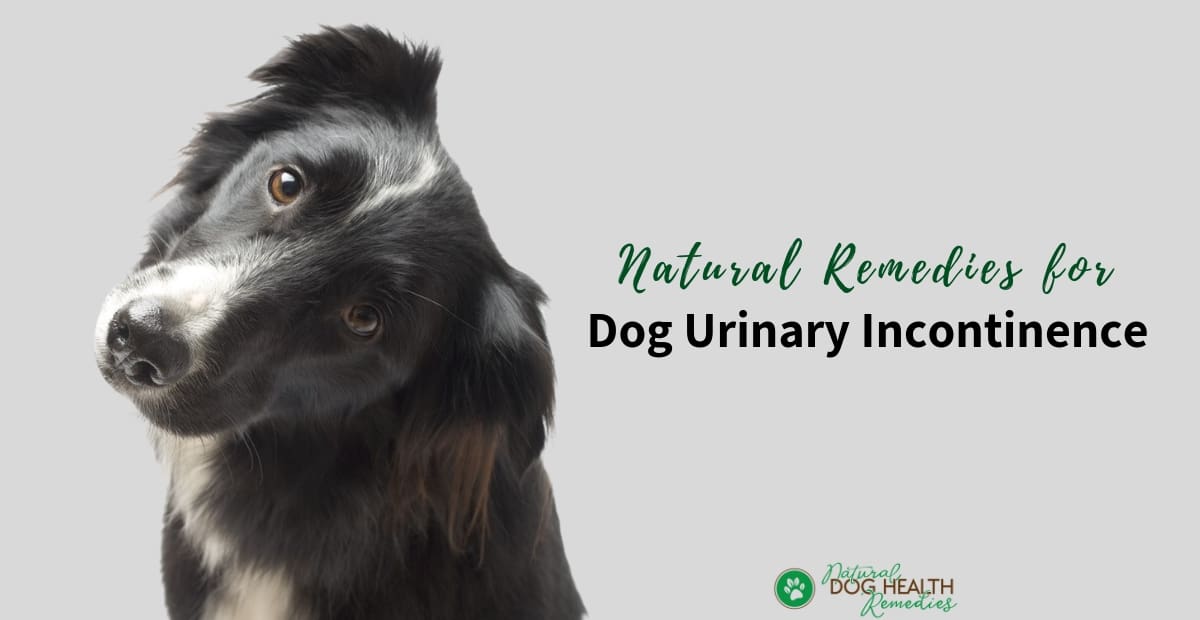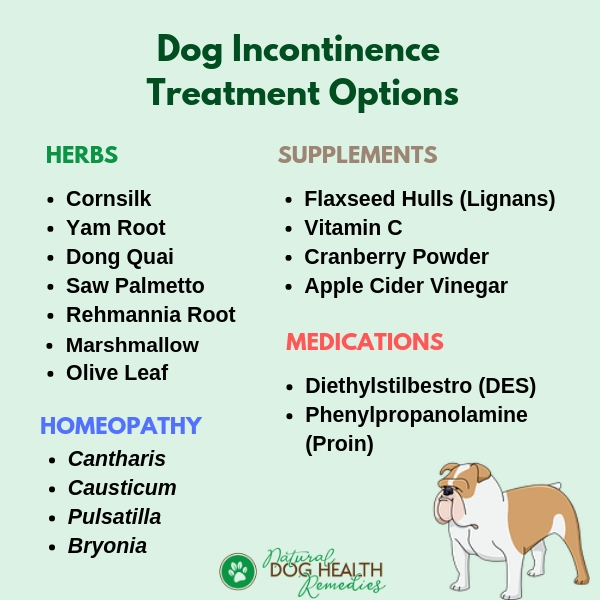Natural Dog Incontinence Remedies
(FTC Disclosure: If you make a purchase via a link on this page, I may receive a small commission, at no added cost to you.)

Overview
There are quite a few possible causes of urinary incontinence in dogs, such as hormone deficiency, bladder stones and other kidney and bladder problems, old age, birth defects, and more.
It is extremely important that we get a proper diagnosis from our veterinarian to find out the root cause of the incontinence.
The reason is, different causes may require different treatment approach. For example, if a dog's incontinence is caused by a birth defect, surgery may be required to fix the problem. No amount of herbs or supplements can stop the leakage until the defect is surgically repaired.
(Visit this page for more detailed information on the many causes of dog incontinence.)
Treating Spay Incontinence Holistically
Quite a few dogs (female dogs in particular but some males as well) suffer from urinary incontinence after spaying. This is the result of low estrogen levels. This type of incontinence is commonly known as "spay incontinence".
There are many ways to treat spay incontinence. And since all dogs are different, you need to experiment to see which treatment options are the best and most effective for YOUR dog (working together with a holistic vet).
It is of course preferable to use natural remedies for spay incontinence, but the truth is, sometimes only home remedies cannot do the job. Conventional treatment in such cases is necessary, so do not rule out the use of drugs.
In fact, many dog parents find using drugs AND natural remedies together works best for their dogs.
Let's take a look at some common spay incontinence treatment options.
Estrogen Replacement Supplements for Spay Incontinence
Conventional treatment of spay incontinence is using a synthetic estrogen medication called Diethylstilbestrol (DES). DES is considered to be relatively safe in low doses.
Sometimes, an additional drug called Proin® (phenylpropanolamine) is used to treat more serious cases of dog incontinence brought on by a weakening of the urethral sphincter.
Proin® unfortunately may cause side effects, such as loss of appetite, restlessness, increased irritability, aggression, increased heart rate, and/or hypertension.
Some dogs may also develop adversed allergic reactions (e.g. hives, swollen lips and tongue, difficulty breathing) to the drug.
In view of the above, you may prefer to use a natural herbal form of estrogen supplement (or a combination of herbal remedy and DES), and only use Proin® as a last resort.
Only Natural Pet Herbal Remedy
This herbal remedy contains:
- Wild Yam: This herb has anti-inflammatory properties and may help resolve urinary tract issues. Also, wild yam has been found to have hormone-normalizing effects by supplying estrogen-like compounds.
- Dong Quai: This Chinese herb is considered a "female herb" as it regulates estrogen levels.
- Corn Silk: This herb is effective for chronic urinary problems, especially chronic urinary incontinence. It contains mucilage and has astringent properties. It supports normal flow of urine because it can tighten and strengthen the bladder lining and smooth-muscle tissues of the urinary tract.
- Saw Palmetto: This herb also supports bladder control by strengthening and nourishing the smooth-muscle tissues of the urinary tract. In addition, it strengthens the prostate and normalizes sex hormone levels.
- Marshmallow: Marshmallow is soothing to irritated tissues and linings.
- Cranberry: Cranberry helps normalize urine pH and prevent UTIs and stone formation.
- Olive Leaf: Olive leaf also helps prevent infections as it has powerful antibacterial properties.
- Pumpkin Seed Extract: Pumpkin seed extract has cleansing action that supports bladder health.
- Rehmannia Root: This herb supports the kidneys and is widely used in Asia for urinary incontinence.
As you can see, all the herbs work synergistically to balance the estrogen levels, tighten and strengthen the tissues of the urinary tract, soothe the urinary tract linings, and prevent bladder infections and stone formation.
Homeopathic Remedies for Dog Spay Incontinence
Homeopathic remedies also work well for dogs with urinary incontinence, especially those who have the problem after spaying.
Common homeopathic remedies for remedies for incontinence include Cantharis, Causticum, Pulsatilla, Bryonia.
Here is a homeopathic remedy product that works well for many pets:
Natural Supplements to Help Dog Incontinence
Some natural supplements can also be given to help dogs with incontinence:
- Lignans: Lignans from flaxseed hulls are a good source of plant estrogens. If your dog has spay incontinence, you may try giving her freshly ground flaxseeds to see if that helps. (One teaspoon to one tablespoon per meal depending on the dog's size.)
 Alternatively, get a supplement such as Organic Flaxseed Lignans
Alternatively, get a supplement such as Organic Flaxseed Lignans.
- Vitamin C: Vitamin C is an antioxidant and immune booster. It can be used to prevent bladder or urinary tract infections, which very often can be caused by urinary incontinence. Vitamin C is also great for the urinary tract lining because it is a natural anti-inflammatory.
- Cranberry: Cranberry can help prevent inflammation of the bladder (cystitis). Cranberry helps keep bacteria from adhering to the lining of the bladder and the urethra, preventing UTIs.
Consider getting some cranberry powder (in capsules) and mix 1/4 of a teaspoon of the powder with your dog's food.
- Apple Cider Vinegar: ACV is another good remedy to prevent and control UTIs because it has powerful anti-microbial properties. Mix 1 teaspoon to 1 tablespoon (depending on the dog's size) with some plain yogurt and give it to your dog.

Another Natural Remedy for Dog Incontinence
If your dog's urinary incontinence is caused by excitement, physical exertion, UTIs (urinary tract infections), or aging, try this natural product.
This formula is a unique combination of herbal extracts and homeopathic ingredients and is effective for relief of frequent urination that is caused by the reasons listed above.
 References
References
M.L. Wulff-Tilford and G.L. Tilford, Herbs for Pets (Bowtie Press, 1999).
M. Goldstein, The Nature of Animal Healing (Ballantine Books, 2000).
R.H. Pitcairn, The Complete Guide to Natural Health for Dogs and Cats (Rodale, 2005).
D. Hamilton, Homeopathic Care for Cats and Dogs (North Atlantic Books, 1999).





